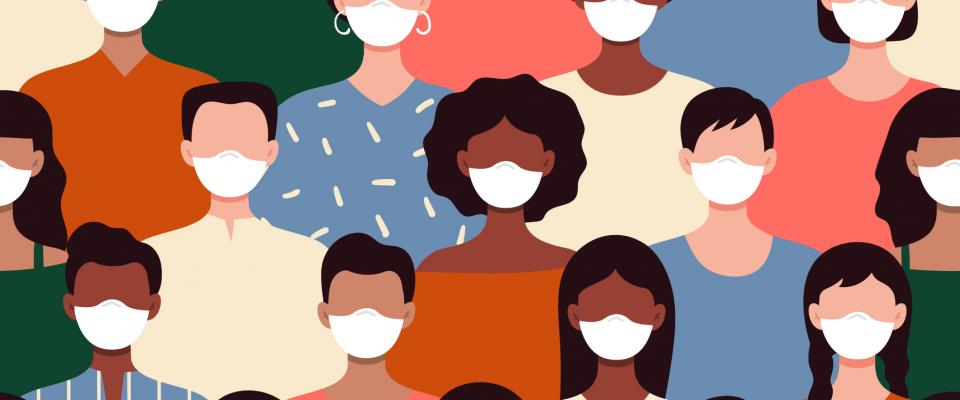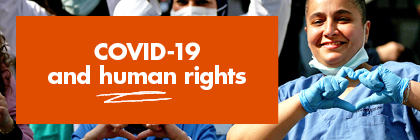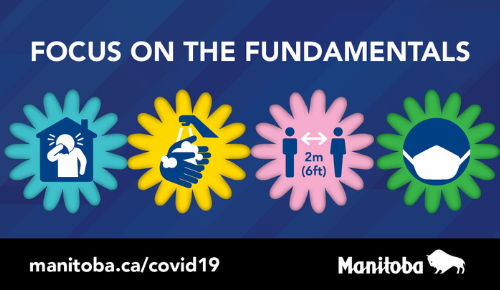
As the COVID-19 pandemic swept across the globe, it touched all Manitobans in some way and led to innovative and unprecedented responses from governments.
Extensive public health campaigns, restrictions on social interaction and freedom of movement, and economic stimulus are just a few of the steps governments have taken in response to the virus.
However, protecting public health can have implications for human rights, including the right to non-discrimination, education, employment and freedom of movement and assembly.
Confinements, lockdowns, travel restrictions, and border closures have been among such measures that have repeated over and over since early 2020.
The Manitoba Human Rights Commission (“MHRC”) is an independent agency of the Government of Manitoba responsible for administering The Human Rights Code (“The Code”) as well as being responsible for promoting human rights principles and educating the public about the rights and responsibilities in The Code.
The MHRC has developed a series of questions and answers for understanding your human rights and obligations during the COVID-19 pandemic. These questions and answers cover the rights and responsibilities of employers and employees, tenants and landlords, as well as residential institutions.

Disclaimer: The answers to the questions posed do not constitute legal advice. The MHRC continues to monitor the evolving situation and will update or add to these questions and answers on an ongoing basis as needed.
Is it illegal for my employer to terminate me if I can’t work because of COVID-19?
Under Manitoba’s Human Rights Code, an employer may not discipline or terminate an employee who has been diagnosed with COVID-19 or is perceived to have COVID-19 (because, for example, they are exhibiting certain symptoms). Similarly, an employer may not discipline or terminate an employee if they are unable to come to work because medical or health officials have quarantined them or have advised them to self-isolate and stay home in connection with COVID-19.
The federal government has called for all travellers entering Canada to self-isolate for 14 days upon entry with exceptions for workers who are essential to the movement of goods and people, and that all Canadians, as much as possible, should stay home.
In these circumstances, employer absenteeism policies must not negatively affect employees.
Employees who cannot work because of COVID-19 may also be entitled to sick or disability or other leave benefits that may be available from their employer under the federal Employment Insurance (EI) program.
Employees also have other rights under Manitoba’s Employment Standards Code regarding termination (e.g. severance and notice of termination). For more information on Employment Standards in Manitoba, visit manitoba.ca/labour/standards
Can my employer lay me off if there is no work to do because of COVID-19? Does my employer still have to pay me?
It is not discrimination under The Code if an employer needs to lay off employees because there is no work for them to do as a result of the impacts of COVID-19.
The Code does not require employers to pay employees if they are not working or if there is no work for them to do because of the impacts of COVID-19.
The Employment Standards Code sets out rights and obligations regarding payment of wages, temporary layoffs, constructive dismissal and termination. For more information on Employment Standards in Manitoba, visit manitoba.ca/labour/standards
Can my employer refuse to let me work because of COVID-19?
An employer should not send an individual employee home, or ask them not to work because of concerns over COVID-19, unless the employer’s concerns are reasonable and consistent with information from medical and public health officials. Currently, Manitoba public health officials are advising workplaces to practice social distancing, which might require some employees to work from home or not work.
MHRC recognizes the importance of balancing a person’s right to non-discrimination with public health and safety, including the need to address evidence-based risks associated with COVID-19 and safety risks.
Therefore, the right to be free from discrimination can be limited under The Code (for example, where health and safety risks are serious and would amount to undue hardship.)
Employers also have obligations for workers’ health and safety on the job under The Workplace Safety and Health Act. For more information on workplace safety and health in Manitoba, visit: www.manitoba.ca/labour/safety
Does my employer have to accommodate me if I test positive or if I become sick because of COVID-19?
MHRC’s policy position is that The Code ground of disability is engaged in relation to COVID-19, as it covers medical conditions or perceived medical conditions that carry significant social stigma.
Employers have a duty to accommodate employees under The Code in relation to COVID-19, unless it would amount to undue hardship based on cost, or health and safety.
Employers should also be sensitive to other factors such as any particular vulnerability an employee may have (for example, if they have a compromised immune system).
Does my employer have to accommodate me if I need to stay home with my kids or an ill family member?
An employer must accommodate an employee who has care-giving responsibilities up to the point of undue hardship.
These care-giving responsibilities, which relate to The Code ground of family status, could include situations where another family member is ill or in self-isolation, or where their child’s school is closed due to COVID-19.
Potential accommodations can include allowing employees to work from home where feasible, permitting employees to work alternate hours, allowing employees to take leaves from work, or other flexible options.
Do I need to get a medical note to support my accommodation request?
MHRC advises employers to be cautious and flexible when making requests for medical notes related to COVID-19. Unnecessarily visiting medical offices increases further risk of exposure for everyone and places additional burden on our health care system.
Can my employer insist that I work despite the current situation with COVID-19?
Employers are entitled to expect that employees will continue to perform their work unless there is a legitimate reason why they An example of a legitimate reason can include situations where it may not be safe for the employee to be at work.
In these circumstances, the employer should explore alternative options for how the employee may still continue to perform productive work for the employer (for example, by working from home, working alternate hours or other flexible options).
Can I refuse to work if I think my workplace is unsafe because of COVID-19?
Employees and employers have rights and obligations under The Workplace Safety and Health Act for workers’ health and safety on the This Act gives a worker the right to refuse work that they believe is unsafe for them or another worker. For more information on workplace safety and health in Manitoba, visit: www.manitoba.ca/labour/safety
I am a contract worker. Do I have the same rights as employees under The Code related to COVID-19?
The right to be free from discrimination in employment under The Code includes full-time and part-time work, volunteer work, student internships, special employment programs, probationary employment, and temporary or contract work.
Under The Code, “employee” is interpreted broadly enough to include contractors, even if they would not be considered “employees” for the purposes of other legislation.
Contractual relationships are also protected as a distinct area under The Code.
I am a tenant who is not working because of COVID-19. What protections exist, if any, if I can’t pay the rent? Can I opt out of my rental agreement if COVID-19 impacts persist?
Negative treatment of tenants who have, or are perceived to have, COVID-19, for reasons unrelated to public health and safety, could be discriminatory and prohibited under The Code.
Before initiating eviction proceedings, or any other measure that may affect a tenant in a negative way, a housing provider is expected to consider whether a Code-related need for accommodation might exist, and whether that need has been accommodated to the point of undue For example, if a tenant fails to make their rent payment on time because they are in the hospital, the housing provider may consider options for having the tenant pay their rent late.
Tenants and landlords also have rights and responsibilities under The Residential Tenancies For more information, please visit: www.manitoba.ca/rtb
Can residential institutions related to child welfare, youth justice, criminal justice, long-term care, etc. impose restrictions such as limiting individuals from visiting their loved ones?
Residential facilities disproportionately house people who identify with protected grounds under The Code, including Indigenous and racialized people, people with disabilities, elderly people, children and youth, and other vulnerable groups.
Under The Code, these individuals have a right to be free from discrimination, and under The Charter of Rights and Freedoms, these individuals have further rights to privacy; liberty and security of the person; the right to be free from arbitrary detention; and cruel and inhuman treatment, subject to reasonable limits.
MHRC recognizes the importance of balancing individuals’ rights to non-discrimination and civil liberties with public health and safety, including the need to address evidence-based risks associated with COVID-19.
Restrictions such as limiting individuals from visiting their loved ones may be justified for health and safety reasons, particularly if such restrictions are based on up to date information from public health However, there may be instances where certain individuals may require accommodations, which could include increased access to phones or video-conferencing for contact with loved ones.
Can my employer, service provider or landlord require me to wear a mask because of COVID-19?
As of September 28, 2020, masks must be worn in indoor public places in Manitoba.
Public health officials advise that that wearing non-medical masks offers important protection to others, especially when physical distancing is hard to maintain.
MHRC’s policy position is that any requirements related to health and safety and COVID-19, such as wearing a mask, using other protective equipment or following a procedure to perform work safely, or to protect people receiving services or living in housing, do not generally cause concern under The Code.
At the same time, employers, housing and service providers should recognize that health and safety requirements such as masks may have a negative impact on vulnerable populations identified by a ground under The Code who may not have access to such Other people may not be able to use the equipment or follow a procedure due to a disability or for another Code-related reason.
People with certain disabilities may have difficulty wearing a mask if, for example, they have severe allergies, experience asthma attacks or have other respiratory Masks are a barrier to people with hearing disabilities who rely on lip reading or facial expressions to communicate. Masks may not be suitable for children and adults with certain physical, intellectual or cognitive disabilities such as autism.
Organizations have a duty under The Code to accommodate these types of individual needs related to COVID-19 requirements, unless it would amount to undue hardship based on cost or health and safety. For example, it may be necessary to provide free masks or other means so that people who face barriers in accessing this equipment can continue to access employment or services without For individuals who cannot wear masks, organizations may explore the feasibility of offering an alternative, such as a clear face shield. In addition, curbside pickup would allow a person to receive a retail service even if, because of their disability, they are unable to wear the required mask to enter a store.
An inability to access or use a mask or other equipment, or to follow a health and safety procedure, must not lead to automatic negative consequences such as employee discipline or termination, complete denial of service or eviction from housing. Moreover, no one should experience harassment or other discriminatory treatment based on a Code ground because they are unable to wear a mask.
In particular, service providers (i.e. stores, restaurant and other public services providers) should be cautious when asking individuals to provide medical information to substantiate their need not to wear a face mask. Unnecessary or non-critical visits to medical offices increases further risk of exposure for everyone and places additional burden on individuals with disabilities or other Code protected grounds who are attempting to access essential Service providers are entitled to explore alternatives, such as curbside pickup or clear face shields, particularly in circumstances where physical distancing may be difficult to maintain.
In some situations, such as an employment or ongoing service relationship, or where risk is increased due to the nature of the service/employment, it may be reasonable to ask for medical information to substantiate a need not to wear a face mask.
Everyone involved should be respectful and flexible and explore whether accommodation is possible, including alternative ways a person might safely continue to work, receive a service or live in communal housing.
Can my employer, service provider or landlord make me do a medical test related to COVID-19 like take my temperature?
MHRC’s policy position is that The Code ground of disability is engaged when employers, housing or other service providers impose medical testing, such as taking your temperature, or having you take a COVID-19 Medical testing to determine fitness to safely perform work, or protect people receiving services or living in congregate housing, may be permissible under The Code if the testing is shown to be effective and necessary in circumstances such as a pandemic.
At the same time, the use of information from medical tests may have a negative impact based on a person’s Organizations should only seek information from medical testing that is reasonably necessary to protect everyone’s health and safety, while excluding unnecessary information that may identify a pre-existing disability.
Any form of medical testing should be effective at assessing an employee’s ability to safely perform work, or to protect people receiving services or living in communal housing. Only a qualified person should conduct medical tests.
A test result must not lead to automatic negative consequences such as employee discipline or termination, complete denial of service or eviction from housing, because, for example, a person is exhibiting certain symptoms or a test shows they have, may have had, or have not yet been exposed to COVID-19.
Organizations have a duty under The Code to accommodate people who are negatively impacted by COVID-19 test results, unless it would amount to undue hardship based on cost or health and safety.
Everyone involved should be flexible in exploring accommodations, including alternative ways a person might continue to safely work, receive a service or live in congregate housing.
Organizations should make clear the reasons why a medical test is needed in the circumstances, and ensure prior, informed consent.
Organizations must explain how they will use and dispose of information from a test and protect the person’s privacy as much as possible.
Organizations should only require the least intrusive means of testing necessary in the circumstances.
I am an employer, service or housing provider. Can I require proof of vaccination from my employers or clients?
Receiving a COVID-19 vaccine is voluntary.
Requiring proof of vaccination to ensure fitness to safely perform work, or protect people receiving services or living in congregate housing, may be permissible under The Code if the requirement is made in good faith and is reasonably necessary for reasons related to safety.
The Code’s protected characteristics of disability and/or religious belief may need to be considered when employers, housing or other service providers impose medical testing or treatment requirements, including proof of vaccination.
Under The Code, organizations have a duty to accommodate people who may be unable to receive a COVID-19 vaccine, for reasons related to disability or religious belief, unless it would amount to undue hardship. Undue hardship can result from things like excessive costs or safety risks.
The right to be free from discrimination can be limited under The Code, where, for example, broader health and safety risks are serious, like in a pandemic, and would amount to undue The MHRC and relevant human rights laws like The Code recognize the importance of balancing people’s right to non-discrimination and civil liberties with public health and safety, including the need to address evidence-based risks and treatment associated with COVID-19.
Everyone involved should be flexible in exploring whether accommodation is possible, including alternative ways a person might continue to safely work, receive a service or live in congregate housing without being vaccinated.
Organizations should make clear the reasons why proof of vaccination is needed in the circumstances, and ensure prior, informed consent.
Organizations should only request and share medical information, including proof of vaccination, in a way that intrudes as little as possible on a person’s privacy, and does not go beyond what is necessary to ensure fitness to safely perform work, or protect people receiving services or living in congregate housing, and accommodate any individual needs.
Organizations should ensure they are upholding the privacy rights of individuals when requesting, handling and storing personal health information.
No one should experience harassment or other discriminatory treatment based on a Code ground because they are unable to receive a vaccine.
In addition, workers have rights and employers have obligations for workers’ health and safety under the Workplace Safety and Health Act. For more information, please visit https://www.manitoba.ca/labour/safety/
Can I incentivize vaccination for my employees, clients or residents by offering them bonuses, discounts or other benefits if they have been vaccinated?
Receiving a COVID-19 vaccine is voluntary.
The Code’s protected characteristics of disability and/or religious belief may need to be considered when employers, housing or other service providers impose medical testing or treatment requirements, including proof of vaccination, or incentivize the receipt of vaccination.
Under The Code, organizations cannot unreasonably discriminate against who may be unable to receive a COVID-19 vaccine, for reasons related to disability or religious belief, unless it would amount to undue hardship. Undue hardship can result from things like excessive costs or safety risks.
As such, incentivizing the receipt of vaccination may discriminate against individuals if they are unable to access vaccine for reasons related to a disability or religious belief.
Can my employer or any service or housing provider require proof that I’ve received a COVID-19 vaccine?
Receiving a COVID-19 vaccine is voluntary.
Requiring proof of vaccination to ensure fitness to safely perform work, or protect people receiving services or living in congregate housing, may be permissible under the Code if the requirement is made in good faith and is reasonably necessary for reasons related to safety.
The Code’s protected characteristics of disability and / or religious belief may need to be considered when employers, housing or other service providers impose medical testing or treatment requirements, including proof of vaccination.
Under The Code, organizations have a duty to accommodate people who may be unable to receive a COVID-19 vaccine, for reasons related to disability or religious belief, unless it would amount to undue hardship. Undue hardship can result from things like excessive costs or safety risks.
The right to be free from discrimination can be limited under The Code, where, for example, broader health and safety risks are serious, like in a pandemic, and would amount to undue hardship. The MHRC and relevant human rights laws like The Code recognize the importance of balancing people’s right to non-discrimination and civil liberties with public health and safety, including the need to address evidence-based risks and treatment associated with COVID-19.
Everyone involved should be flexible in exploring whether accommodation is possible, including alternative ways a person might continue to safely work, receive a service or live in congregate housing without being vaccinated.
Organizations should make clear the reasons why proof of vaccination is needed in the circumstances, and ensure prior, informed consent.
Organizations should only request and share medical information, including proof of vaccination, in a way that intrudes as little as possible on a person’s privacy, and does not go beyond what is necessary to ensure fitness to safely perform work, or protect people receiving services or living in congregate housing, and accommodate any individual needs.
No one should experience harassment or other discriminatory treatment based on a Code ground because they are unable to receive a vaccine.
In addition, workers have rights and employers have obligations for workers’ health and safety under the Workplace Safety and Health Act.
I do not believe in vaccinations (or masks and lockdowns). Does The Human Rights Code exempt me based on my belief from COVID-19 requirements like providing proof of vaccination?
Not all beliefs amount to a religious or political belief under The Code. And not all religious or political-related needs must be accommodated in the Code-protected areas, such as employment, facilities and services or housing, especially when serious risks to public health and safety are shown to exist like during a pandemic.
The Code does not define religious belief or political belief. The Commission’s Policy on the Definition of Religious Belief and Policy on the Definition of Political Belief sets out guiding factors, based on case law, to help organizations make these determinations.
The Commission’s position is that a singular belief or personal preference against vaccinations or masks does not appear to be protected on the ground of religious belief or political belief under The Code.
The Commission is not aware of any tribunal or court decision that found a singular belief against vaccinations or masks amounted to a religious or political belief within the meaning of The Code.
Moreover, the requirement to wear a mask or prove vaccination may represent a reasonable and bona fide requirement for health and safety reasons, depending on the circumstances.
Source: The Manitoba Human Rights Commission
The MHRC has also released principles and actions to inform a human rights based approach to the COVID-19 pandemic. For a copy of the report, please click here.
For additional information visit manitobahumanrights.ca
Email: hrc@gov.mb.ca
7th Floor 175 Hargrave Street
Winnipeg, MB R3C 3R8
Phone: 204-945-3007
1-888-884-8681 (Toll Free)




